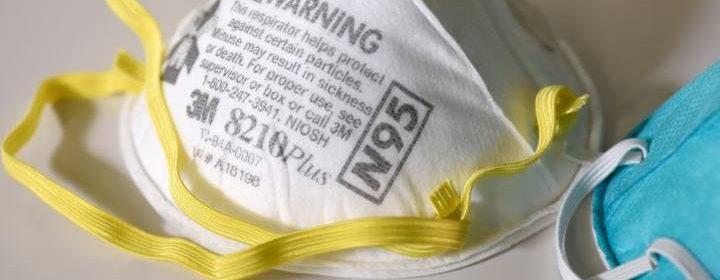University of Manitoba researchers look for ways to clean and reuse N95 masks

Researchers in Winnipeg say they may have found a way for health-care workers to reuse N95 masks up to 10 times while treating patients with COVID-19.
Demand for personal protective equipment — including the all-important N95 masks — has been soaring around the world as overtaxed doctors, nurses and hospitals struggle to manage the spike in COVID-19 cases while protecting themselves from infection.
The work, led by University of Manitoba researcher and critical-care physician, Dr. Anand Kumar, started in mid-March and looked at different ways of sterilizing used masks.
“Medical masks are used by health-care workers, with the N95 providing the best protection against tiny aerosol particles that carry the novel coronavirus,” explained Kumar, in a release.
“Our team wanted to explore how different brands and models of N95s responded to standard hospital sterilization technologies in an attempt to identify safe options for their reuse in the event of supply shortages.
“At the start of the pandemic, it was clear we were going to be facing dramatically heavy demands for the N95s.”
N95 respirators are form-fitting masks designed to seal around the nose and remove 95 per cent of tiny airborne particles. They are typically used by health-care workers and paramedics.
Partnering with Canada’s National Microbiology Laboratory (NML) and the Health Sciences Centre in Winnipeg, researchers tested four different types of N95 masks with four different sterilization methods.
[ Sign up for our Health IQ newsletter for the latest coronavirus updates ]
Those methods included repeated cycles of standard autoclaving, ethylene oxide gassing, ionized hydrogen peroxide fogging, and vaporized hydrogen peroxide treatment.
After cleaning, the masks were tested for fit, as well as structural and functional integrity.
Questions about COVID-19? Here are some things you need to know:
Health officials caution against all international travel. Returning travellers are legally obligated to self-isolate for 14 days, beginning March 26, in case they develop symptoms and to prevent spreading the virus to others. Some provinces and territories have also implemented additional recommendations or enforcement measures to ensure those returning to the area self-isolate.
Symptoms can include fever, cough and difficulty breathing — very similar to a cold or flu. Some people can develop a more severe illness. People most at risk of this include older adults and people with severe chronic medical conditions like heart, lung or kidney disease. If you develop symptoms, contact public health authorities.
To prevent the virus from spreading, experts recommend frequent handwashing and coughing into your sleeve. They also recommend minimizing contact with others, staying home as much as possible and maintaining a distance of two metres from other people if you go out.
For full COVID-19 coverage from Global News, click here.
Source: Read Full Article
